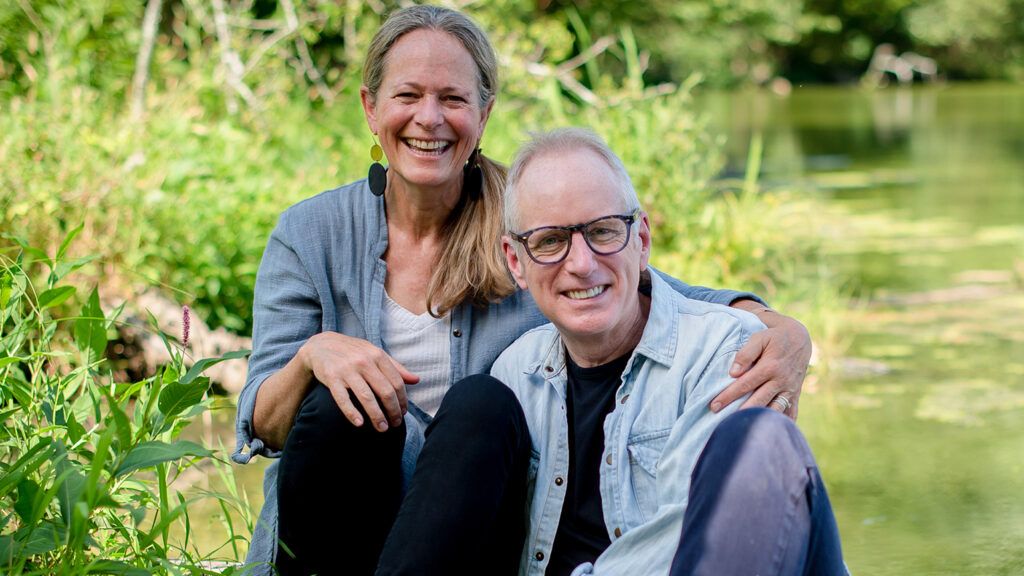I lay in bed asking a question I never imagined I’d ask: Was my marriage about to collapse?
My wife, Anne, and I were recent empty nesters. After nearly 25 years working and raising a family in the Northeast, we’d moved to Nashville to start the second act of our life together. I passed the reins to younger leadership at the church I’d planted in Connecticut. Anne left behind a middle school teaching career. Our three kids were away at school. For the first time since our newlywed days, it was just the two of us.
It wasn’t turning out the way I’d planned it would.
Anne had been reluctant to move. She didn’t seem to understand that after a pastor steps down, he can’t keep attending the church he once led. That’s unfair to the new leadership. I needed a change anyway. The church had been my life. Only a clean break would disentangle me from the web of relationships and responsibilities.
I’d grown to love Nashville after spending time here to work on the side as a songwriter, a passion of mine. I urged Anne to keep an open mind, but she valued routine and tranquility. The move felt traumatic to her, she said. I couldn’t understand it. Nashville seemed like a great change of pace to me.
We began arguing the moment we arrived. After years of biting her tongue as a pastor’s wife, Anne suddenly told me what she really thought. Her uncharacteristic bluntness took me aback.
“You’re selfish, Ian,” she said. “I devoted myself to supporting your ministry. Did you ever thank me? Now you’ve dragged me to this place, where I know no one. How long do I have to keep living your life? I don’t even know who I am anymore!”
“I wish you would find out!” I shot back. How unfair to blame me! Was it my fault Anne avoided conflict and shied away from asserting herself? I’d longed for her to break free and discover her own interests and passions. Yet every time I said so, she turned sullen and told me I just didn’t understand.
We went to see a marriage counselor. Piled our bedside tables with relationship books. Went on marriage retreats. The more we butted heads, the more we each silently wondered whether divorce was the only way out.
The problem was, Anne’s conception of me was out-of-date. I had been a self-centered frat boy when we met in college. And I did at that time have an alcohol problem, which harmed our relationship. But just a few years after we married, I attended 12-step recovery meetings and got sober. I hadn’t had a drink in years.
True, I hadn’t always been the most involved husband and father. Pastoring is a full-time job and then some. Ours was a family ministry. Everyone played a role. My love for my wife and kids was never in doubt, at least in my mind.
Anne’s feelings would have been justified if I’d become one of those functioning alcoholics who copes with stress by getting drunk every weekend. But I’d dealt with my drinking. I’d built a life around ministry. I was there for my family when it counted.
Lying awake, trying not to think about divorce, I eventually ran out of complaints. The thought of life without Anne was unbearable. When we’d met as undergraduates at Bowdoin College, in Maine, she’d felt like my salvation, the light of my life.
I grew up in a family ravaged by alcoholism. My hard-drinking father had a triple liver bypass, multiple strokes and a heart attack. Two of his sisters died from alcohol-related causes. I took my first drink at age 13 at the home of a friend whose parents were away. I drank so much, I passed out and had to be rushed to the hospital in an ambulance to be treated for alcohol poisoning.
For more than a decade, I lived a double life. To my party friends, I was the crazy guy always ready for one more drunken stunt. At church, I was an earnest member of the youth group, sensitive, artistic. Deep down, I was plagued by self-doubt, a sense that I lacked something essential that everyone else had. Drinking wiped away those insecurities.
Then I met Anne. With her, I could be myself. She was kind, steady, patient, deeply faithful—everything I’d lacked and yearned for growing up. We fell in love right away and married soon after graduating. For years, our partnership seemed to work—for me anyway. I began a job with Young Life, a nondenominational youth ministry, and then attended seminary. Anne pursued teaching. Our first child was born four years after our wedding.
Around that time, I saw a therapist to deal with depression left over from my childhood. “How much do you drink each day?” the therapist asked. She refused to treat me until I dealt with what she called my alcohol problem.
I bristled at what the therapist said, but the signs were obvious. I was stashing liquor in the garage and sneaking drinks when no one was looking. My behavior was alarming and embarrassing Anne. I attended some 12-step meetings and vowed to stop.
To my astonishment, I did stop. It was a relief to name the problem and commit to overcoming the family curse, to turn my life over to God. Sober, I felt invigorated at work. I delighted in the birth of our daughter. Eventually I stopped going to 12-step meetings. I was cured.
So why, all these years later, did Anne keep talking about me as if I were still the boozing, immature frat boy she’d met in college? She was the one who hadn’t changed. Heck, why had she married me in the first place?
The sleepless nights and daily arguments continued. I was growing desperate. I begged God to help me see Anne with the same love he saw her. A friend noticed how haggard I looked and asked what was wrong.
“Anne and I are really struggling,” I said. “Nothing seems to be working.”
“You want to know what worked for us?” my friend said. He and his wife had endured a similar period of conflict. “The Enneagram.”
“The Ennea-what?” I said.
“It’s one of those personality tests,” he said. “We attended a marriage retreat where you learn about how your personality type affects your relationship. It changed everything for us.”
I gave him a skeptical look.
“I felt the same way,” he said. “Now I can’t recommend it enough.”
Personality type. Was that what our problem was? Seemed too easy. But Anne was open to the idea. Maybe we were both desperate for a solution, no matter how off-the-wall it might seem.
We enrolled in a weekend Enneagram retreat hosted by a church in Houston. We were led through exercises to determine where we landed in the Enneagram’s system of nine interrelated personality types.
I was surprised when the exercises zeroed in on our personalities with uncanny accuracy. According to the Enneagram, I was a Type Four, an individualist ruled by outsize emotions and driven by a mix of ambition, yearning and envy of others’ seeming perfection.
Anne was a Type Nine, a peacemaker whose dread of conflict was so profound, she would merge with others’ desires and viewpoints to the point of total self-effacement. That could be great for the people around her but terrible for her self-development. Like many Nines, she ended up feeling resentful and unsure of what she really wanted.
The weekend was a revelation. Suddenly Anne and I saw each other with new eyes—with God’s eyes, understanding at last the fragile, imperfect people we were beneath the makeshift performance of everyday life. And I saw myself. One of the key characteristics of a Type Four is a belief that only someone or something else can fix our deep-rooted imperfection. Type Fours look for mates who can “complete” them.
I had done that with Anne, using her steadiness and devotion to help prop up my own fragile ego. Work also helped fill the hole. So did travel, songwriting and a constant quest for accomplishments or new experiences.
And, of course, the first of those hole fillers had been alcohol. No wonder Anne kept talking about me as if I’d never left my drinking days behind. I’d quit the alcohol, sure. But not the -ism. I’d just turned to new substances, including Anne herself. It was an unfair and intolerable burden to place on her.
“I’m sorry for all the ways I’ve let you down,” I said to Anne on the last night of the retreat. “I feel like I’m seeing the real you for the first time. Can you forgive me?”
“I can,” Anne said. “I understand now why you are the way you are. We both have a lot to forgive.”
By now we were both wiping away tears. I reached out to Anne to hold her. “I am so looking forward to our second act,” I said.
“Me too,” she said. “I love you.”
Love. It had been the answer all along. It always is. But so often we lose touch with it, wrapped up in our own fears and ego needs. Now I felt God stripping all of that away.
Back home in Nashville, I began attending 12-step meetings again. This time, I took the program seriously, found a sponsor and worked the steps. The day I made explicit amends to Anne was one of the most freeing days of my life.
Anne changed after the retreat too. She attended Al-Anon for the first time, made friends, saw a counselor, got more involved at church and even learned to teach others how to use the Enneagram.
My commitment to sobriety remains a cornerstone of my life. The new direction I took after that retreat became the foundation for a whole new career as an Enneagram teacher. I’ve also written a best-selling book, The Road Back to You: An Enneagram Journey to Self-Discovery, and delivered talks all over the country about how understanding personality with a spirit of love and vulnerability can change people’s lives.
In a way, 12-step programs and the Enneagram share a key characteristic. Both are systems, ways of understanding and living. If you dabble in them, the way I dabbled in the 12 steps early in my marriage, they may or may not help you. But if you are ready to see yourself as God sees you, with all your strengths and flaws, and if you are ready to surrender to God and let him lead you on a better path, you can do amazing things.
You can even heal a broken marriage and embark on the second act of your life with the person you love most in all the world.
 |
Ian Morgan Cron is a psychotherapist, Enneagram teacher, host of the popular podcast, Typology, and author of the national bestseller, The Road Back to You: An Enneagram Journey to Self-Discovery. |
For more inspiring stories, subscribe to Guideposts magazine.





